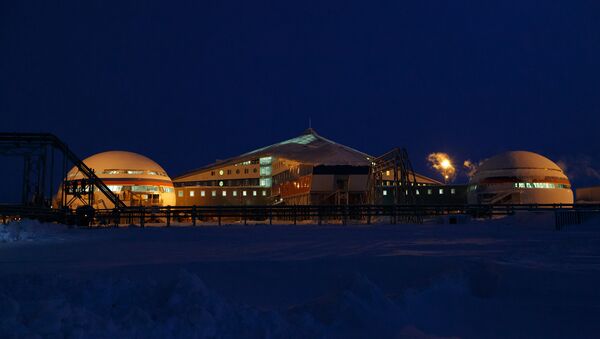The United States might build a base far north in Alaska to counter Russian presence in the Arctic region, but many consider the idea ill-conceived, a Defense News report says.
According to the 2020 National Defense Authorization Act written by the Senate Armed Services Committee, the Pentagon, the head of the Joint Chiefs of Staff, the Army Corps of Engineers, the Coast Guard and the Maritime Administration will be tasked to work together to identify and mark potential sites for a strategic port in the American Arctic. The bill is slated for a vote next week, according to Defensenews.com.
The rationale is that the port will counter Russia’s activity in the Arctic, including the cutting-edge “Northern Clover” air defence military base at the Franz Joseph Land archipelago. Russia sees the Arctic as a region of emerging new trade routes and of untouched vast oil and gas deposits, which President Vladimir Putin estimated to be worth $30 trillion.
Proponents of an American Arctic base say it is beneficial in that it will force Russia to spend money on countering a new threat.
“The plus side of putting a port up in [the Arctic] is that you don’t have to do a whole hell of a lot to force the Russians to put a lot of resources up there to counter it. The cost of maintaining, say, an airbase in the Arctic is enormous. And those are resources that could be used otherwise to threaten, for example, countries in Europe,” said Dan Goure, a former UK defence official and analyst, according to Defense News.
Bryan Clark, a retired submarine officer and analyst with the US Center for Strategic and Budgetary Assessments, warns that US and Russian needs, capabilities and approach in the Arctic is vastly different, indicating that a Cold War-era strategy of mindlessly mirroring each other’s advancements is irrational.
“We don’t use the Arctic the same way the Russians do. We don’t have the same exposure as the Russians do. They’ve got 7,000 miles of coastline, it’s difficult to patrol and they’re somewhat neurotic about homeland defence anyway. It’s a perceived vulnerability on the part of Russia and has been for a long time, so they’ve always put a lot of money into the ability to break ice, maintain access,” he explains, according to Defensenews.com.
According to Clark, “comparing our Arctic capabilities to theirs, it’s kind of off base because you are comparing two very different countries on things that they need in different amounts.”
While Clark agrees that operating in northern seas is generally a good idea, he underscored that putting a base on Alaska’s northern slope would be a disaster.
“It’s too expensive, and then you’ll build it and not be able to use it for a large part of the year. It becomes a white elephant,” he said, adding that melting permafrost will turn Alaska’s northern coast into a marshland. Clark suggest designating a base farther South, at Alaska’s western coast, nearer to Russian shores, as a better idea.
Currently, the US’s capabilities of operating a fleet in the Arctic is limited, at best. While Russia has a massive fleet of ice-breakers, the US has just two, only one of which is currently operational. The Trident Juncture exercise in October 2018 also revealed that logistic challenges for supporting a carrier strike group in the Norwegian Sea was the biggest issue of the entire drill.
“Operating at the far end of the logistics chain, it was really important for us to see how we could do that, how it would work, and we took a lot of lessons from that,” US Sixth Fleet Commander Vice Adm. Lisa Franchetti said after the drill, according to Defense News.




